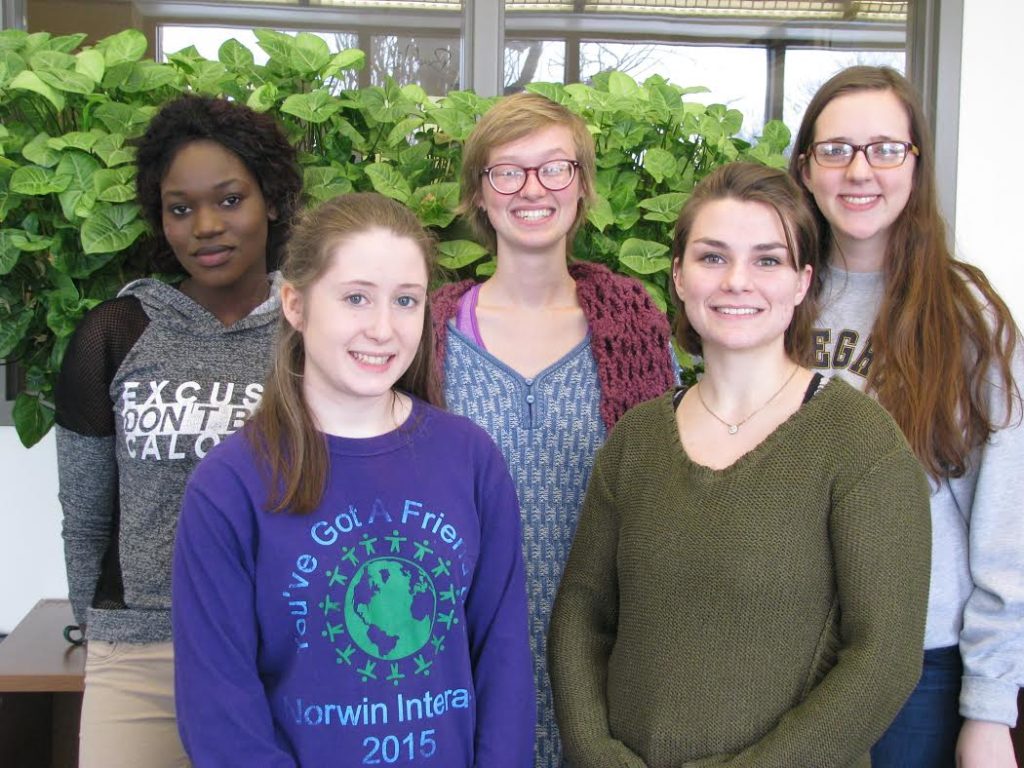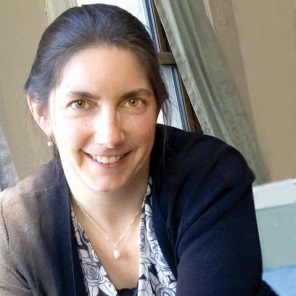
Allegheny Students Learn to Be ‘Shopping Buddies’ for Refugee Families
American grocery stores can be a mind-boggling labyrinth for refugees settling in this country: Aisles and aisles of marketing glitz, competing brands, confusing nutrition information, and puzzling pricing that isn’t easy to decipher for those new to the shopping game.
Recognizing that challenge, Allegheny College is training students to work with refugee families in Erie, Pennsylvania, to help them navigate unfamiliar grocery stores, as well as apply for the Women, Infants, and Children’s (WIC) Nutrition Program.
Erie has a large refugee community that has been growing steadily, but transitioning into the new area can be a daunting task for the families. That is why Professors Caryl Waggett and Kirsten Peterson decided to partner with WIC, the Area Health Education Center (AHEC), and the Multicultural Health Evaluation Delivery Systems (MHEDS).
“I just can’t imagine moving to a new country with nothing other than your family, and navigating this incredibly Byzantine system,” says Peterson, referring to WIC’s complex benefit system. “Everything is just so new and so different. I admire and have tremendous appreciation for these women who are even willing to try.”
For the past six years, Waggett has been working with refugee populations as part of one of her classes, especially focusing on the Erie International Institute, a resettlement agency. She has seen the agency’s struggles due to its very limited resources for helping incoming refugees. One main limitation is the time volunteers are granted to work with the families. The agency representatives have 90 days to spend with the family, and as a result focus their time firstly on getting the head of the household–usually the father–a job, and then getting the children enrolled in the school system.
“Everyone recognized that women were getting the last bit of attention,” Waggett says. “The head of the household was typically the male in most of the families that were arriving, and they got a lot of attention, because getting somebody employed is really essential for long-term viability and health in the family. That’s the single top priority, followed by getting kids in the school system. Women tend to be the last on the list in terms of getting critical resources, but typically women are also the functional head of the house; they’re the center of making sure everything’s running, keeping people from getting sick, taking care of all the food and management, and when they arrive here they’re secondary to all of that.”

Peterson serves on the AHEC board in Erie, where the executive had the initial idea of working in conjunction with WIC and MHEDS in starting a program to help the mothers. She had the idea and the resources but needed volunteers to carry out the program – so Peterson turned to Allegheny. She and Waggett recruited students and trained them with the necessary information and skills they would need to help refugee families.
Peterson says she immediately thought of Waggett when looking for a way to recruit students. “When anyone asks me about refugees, Caryl’s the first person that comes to my mind. She knows what she’s doing, she’s got the students or knows the students who are most likely to want to be involved in this kind of thing. And even though we’re 35 miles away and there are colleges that are closer, it’s our students who have already been involved in working with refugee populations, not only in Erie, in various capacities.”
Erin Zehr ’19 was one of the first group of trainees for the Shopping Buddies program. “I was part of the first cohort of students who was trained as a ‘shopping buddy’ during the seminar course last semester. We took a course to learn about critical nutritional needs, WIC (Women, Infants, and Children Food and Nutrition Service) guidelines, socio-political challenges in the countries of origin, and cultural barriers that refugee families typically encounter.”
Students selected for the program take a Global Health Fieldwork class, which is designed to help students think about the practical components of work outside the classroom, focusing on theory and learning skills. Students from a variety of different programs take the course, and learn some material as a group but also split off into independent groups focusing on the various projects they are participating in.
Once trained, the students are paired and connected with a family, as well as an interpreter through one of Erie’s services. They will get to work with the family only a few times because the families get WIC benefits monthly, and thus shop for groceries once a month.
Waggett says, “Our hope is that in working with the families multiple times, they are able to figure out the store and then start to become sufficiently competent and independent, so they don’t need an interpreter or us with them, and even with limited language skills they are able to go shopping comfortably and independently. Having more time to interact with the mom up front to hear what their issues and needs are helps in getting them to be more effective in what they’re doing. The idea is that we’re strengthening the women’s capacity, that we’re not just shoppers. All that entails is thinking about the women, networking with them, helping their network with each other, and thinking about other ways to strengthen the tools they have to address their needs.”
Through helping the refugee families in the learning process, the students have in turn learned a lot about the families, their home countries, and the resettlement process. It’s partially because of this that every one of the students who participated has contacted Waggett or Peterson about wanting to continue in some capacity.
“I have learned about the demographics of the refugee population in Erie and the barriers they face, particularly with navigating an unfamiliar dietary landscape,” Zehr says. “With this program I have gone on grocery store visits, where with the aid of an interpreter, another student and myself helped a refugee mother understand and use her WIC benefits. This process has shown me the significant challenges refugees face from their countries of origin, to refugee camps, and after they are resettled in the United States. I have learned about the resettlement process and the policy which surrounds that, and all of the significant barriers which refugees experience in the United States. More abstractly, I have also learned how important it is to be adaptable and innovative when there are significant restrictions and obstacles for the refugee community, as there have been since this past January.”
Waggett explains that the program’s focus on the mother to improve the entire household’s capability is based on development studies over the past forty years. The World Health Organization, the Food and Agriculture Organization, and various U.N. Initiatives have all found that investment in women’s health and women in general, especially when they have children, will have a huge multiplier effect.
“So if you invest in women you’ll see the kids get better, the community increases because they re-invest the money in their friends who are trying to grow food, and the small businesses locally. That same multiplier effect does not exist by investing in other sectors of the population. We’ve recognized that one of the most effective strategies is putting women in this role where you invest in them, and they immediately invest for the rest of their family. This effort is designed specifically to focus on improving the strategies for helping women and women with children, and get it to get improve much more rapidly so that they can strengthen their families much faster. It’s a really important approach for a number of reasons. It matches what we understand about the theory of how to improve people’s livelihoods, especially when they’ve moved to a new area.”
Currently, Waggett and Peterson are in the process of interviewing and selecting a new group of students for the spring 2018 semester. Since they have some students returning to the program, Peterson is hoping to implement a buddy system.
“Someone who had already done it would pair with a student new to the program and a family, because it’s very exciting but also can be scary – you’re meeting a family who doesn’t speak your language, and you’re working with an interpreter who you haven’t met before.”
Waggett adds, “students aren’t necessarily facile with shopping themselves – most of them haven’t been menu planning and food planning for an entire month on their own, and certainly the WIC is an added challenge that many of our students aren’t familiar with. Navigating WIC benefits in and of itself is part of our role. WIC is designed to help a unique population, but has some incredibly difficult challenges to it.”
Recently, Waggett and Zehr shared the initiative at the Children’s Hospital of Pennsylvania (CHOP), which held a conference through their global health program on the needs of refugees. Waggett recalled, “This program was met with a lot of enthusiasm but surprise as well – no one had seen anything quite like this. A lot of refugees come in each year, and while Erie is a surprisingly large host city, it is certainly not the only one. We haven’t seen this type of model focused on supporting women, and I think it’s really intriguing – a great opportunity for both the refugee community and for our students.”
Says Peterson, “We’re pioneers.”
Editor’s Note: Peterson and Waggett are two of many in the Allegheny community working towards building a multidisciplinary area of strength specifically directed towards refugees, to implement initiatives that serve the community as well as the students on campus. Each summer for the past four years Allegheny students have interned with the Erie International Institute assisting with resettlement efforts. In Spring 2016 the College sponsored “Welcome the Stranger” conference here on campus focused on refugees. In November 2017 Allegheny’s Global Citizen Scholars Program sponsored the visit of “New Americans in the Rust Belt” photographer Maitham Basha-Agha. In addition, Allegheny has a number of faculty who have worked on a variety of refugee projects over the past years, including Profs. Shanna Kirschner (POLSC / IS/MENA), Shannan Mattiace (POLSC, IS), Brian Miller (HIST/IS), Younus Mirza (RELST/IS), Laura Reeck (FRNCH/IS and Global Citizen Scholars), Dave Roncolato (COMJ and Global Citizen Scholars), Eric Boynton (RELST), and Aline Lo (ENGL). They are building relationships with members of new American refugee communities, and with a number of Erie-based agencies.
Photo caption: First group of Shopping Buddies in March 2017: Clockwise from front left: Rachael Cohen ’20, Sara Waya ’19, Merryn Spence ’19, Erin Zehr ’19, and Shanna McGowan ’17.